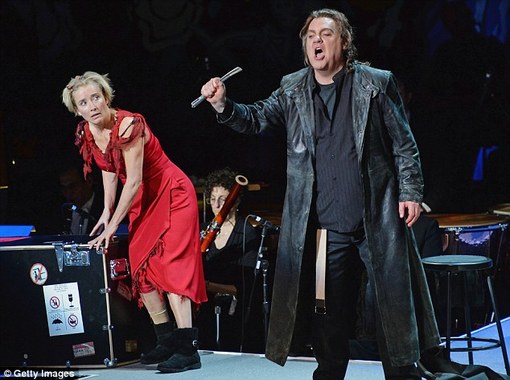|
This week's contestant is Paul Kivocavic of Minneapolis, MN, who teaches music at Concordia College. The composer style is pretty easy to get, I think. But the hidden song is...well, very well hidden. Even when Bruce Adolphe plays it again to bring out the song, not only did I nor the contestant still get it. Only when Adolphe began humming along did Mr. Kivocavic guess it -- and I sort of thought maybe possible I knew. (I was right, but only by the tips of my thumbs.) It's a well-known song, just even better hidden.
After the song is revealed, it's worth noting that host Fred Child has a very clever pun of a quip.
0 Comments
I'm one of eight people in the world, I believe, who doesn't play golf on a regular basis, or even much, yet loves watch it on television. I once even listened to the British Open on the radio! It was a joy, therefore, watching the Ryder Cup this week between a team of players from the United States and those from Europe. But it was even more so because the Cup was played this year at Gleneagles in Scotland. That's because years ago on a family trip, when I was a kid, we stayed at Gleneagles. It's a legendary links golf course that opened 90 years ago in 1924, and beyond the history, it's ethereally gorgeous. My dad's a bit golf lover, so the purpose in staying there was of course to play several rounds. I was just a kid, and hadn't played much, but I joined him for a round. Well, okay, it wasn't a full round, but I did play a hole. Okay, I actually didn't play a full hole, but I did hit several shots. Mind you, I didn't get off the tee. But it wasn't for lack of trying...
I intended to play the round. Or at least a few holes. Or just one hole, but the problem was that my first tee shot went slicing off far to the right and went flying into the gorse -- the deep, thick shrubbery that surrounds the fairway. As you might imagine, there's a whole lot of gorse, and ball that goes in there is pretty much gone for ever. So, I set up another ball, and tried again, giving it a good thwack. And again, the ball sliced and soared deep into the gorse. And again. And again. And again. And... Well, you get the point. After six straight tee-shots (well, not "straight" in a directional sense, but in a row...) lost into the gorse, bracken and woods of Scotland, my dad politely asked if I'd please stop playing and would instead join him to walk around for the 18 holes. It wasn't so much the cost of all those expensive golf balls which, if things continued at this pace for 18 holes, let alone one, we might not be able to afford the trip home, but rather that he had only so many balls in his golf bag, and wanted to be sure that he'd have enough to play the course himself. I'd have loved to keep trying, but I did understand his point. And so, I walked the 18 holes with my dad. But I still have the memory of teeing off at Gleneagles -- even if I didn't get past that. And an equally joyous memory of walking through that remarkable setting. I thought the Live from Lincoln Center production of Sweeney Todd was quite good. I do think the show is served better than many shows with a full production, rather than concert staging, since it helps enforce the imposing sensibility, particularly with the barber chair, the bodies sliding to the basement and the furnace. But they did a very good job under the condition. (I particularly loved how they had Bryn Terfel as Sweeney slam down his script during the opening, and then glaring at the others as a challenge that they do the same, which they did.) I think Terfel was wonderful. As I mentioned, I'd seen him do the role previously with the Chicago Lyric Opera, and it was clear how well-versed he was with the show. And Emma Thompson was terrific, returning to her stage musical roots. She sang very well, though notably better in the lower register. But it confirmed what I wrote before how the role calls more for a comic actress than a great singer. Her interpretation of the role was more grounded than crazed, which is hope Angela Lansbury did it in the original. I think I prefer the latter, it's less realistic but more believable. But again, Emma Thompson was wonderful. (I've also seen Patti Lupone do the show at the Ravinia Music Festival, with George Hearn starring as Sweeney, the role he replaced on Broadway. That production at Ravinia was semi-staged.) My only complaint has nothing to do with the show itself. It's the pre-introduction with Kristin Chenoweth. (They did a full introduction of the show after, with Audra MacDonald.) At the end of Ms. Chenoweth's comments, she welcomed us to watch Sweeney Todd and then added with enthusiasm, "starring Oscar-winner Emma Thompson!" and that was it. Period. The end. No mention of...er, Bryn Terfel. The man who plays the freaking title role. Sweeney Todd. That's the show's name, y'know, Sweeney Todd: The Demon Barber of Fleet Street." And the first words sung are, "Attend the tale of Sweeney Todd." That guy. Sweeney Todd. You can't miss him. He's the one with the knife. Killing everyone. On stage most of the time. I'm not sure who's to blame for it. I don't know if someone wrote Kristen Chenoweth's comments. I don't know if she wrote her own words. I don't know what the director was listening to, and what the producer thinking. But if someone wrote it, they're at fault for an egregious oversight that can't be blamed on an oversight because it would have been prepared in advance. And she's at fault, as an actress, for knowing very well about credit and who's starring and what the name of the show is. And the director is at fault for letting this go through. And the producer is at fault for putting it on the air, uncorrected. It was so oddly egregious that I couldn't believe that they actually left his name out. So, afterwards, I went back to the very start, since I had recorded the broadcast. And it's just not there. Watch Sweeney Todd starring Oscar-winner Emma Thompson. Really, you don't want to piss Sweeney Todd off... If you missed it, here's the entire thing. The full production and even Audra MacDonald's introduction. Everything. Except, happily, Kristen Chenoweth's pre-amble. It's been a quiet week, as we're now past the archives of old episodes. Pastor Liz fills in while the Lutheran Church interviews replacements for Pastor Haugen, news of Marlene’s interesting encounter with Father Wilmer spreads through the town, Mrs. Anderson holds a CD release party at the Sidewinder Bar, and the Tolleruds’ rooster Ludwig comes to a sad end.
I love following Northwestern football. Even when they've been good, that's generally hard to do. And they usually haven't been all that good. Better over the past decade, but still you're always on the edge of your seat wondering....
They've been lousy this year. Going into today's game they were 1-2, and that's only because they beat that national powerhouse, Western Illinois. And had trouble with them. Today, they were playing Penn State. An actual, traditional national powerhouse. Who's 4-0 this year. Ranked #27 in the country. And playing at Penn State on Homecoming, with over 107,000 Penn State fans in the stadium. Penn State was a big 11-point favorite. My dad -- who's a far bigger lover of Northwestern football fan than even me (having had season tickets to their games for 50 years, including during their record-setting 34-game losing streak -- was quipping that the game would likely be over at 10:15. It was starting at 10 AM. Northwestern won. Actually, they didn't just win, they crushed Penn State 29-6. And it easily could have been 37-6. They missed two extra points, had a very short field goal which they bypassed for a fake, and missed a makeable field goal. (And they also scored a touchdown on a fumble recovery that the officials called a dropped pass and negated the score.) I'm okay with that, mind you. If they'd lost by seven points I'd have been shocked. That they won by 23 is just fine by me... Yes, I know that I periodically describe certain videos as remarkable fines. Put this on the list. In fact, put this one way near the top of the list. It's not that I didn't think the tape would exist -- I didn't think it would be even possible for it to exist. This isn't for everyone. It's very obscure (which is a large part of the point of not thinking it could even possibly exist), but if you're interested in the history of Broadway, this is buckle-your- seatbelt time. There are three utterly-charming, whimsical plays from somewhat the same era (not exactly, but within about 10 years of each other) that are just simply among my favorites, all of which were made into great movies -- Harvey, Arsenic and Old Lace, and Teahouse of the August Moon. Back in the early '70s, a Broadway musical was made of Teahouse of the August Moon. It is a famous, disastrous flop. The show was called, Lovely Ladies, Kind Gentlemen, taken from how the character of Sakini addresses the audience. It opened in late 1970 and only ran for 19 performances. Though I knew it was a huge flop, I love the source play and movie so much I always wished I could see it. At the very least, though, for something that big a flop, my realistic hope was that I could find just one song from the show. I don't mean from the original production, that's not the realistic part, I mean that maybe someone has recorded a song or two from it. Or a demo album was made. People often ask me how I find these obscure videos. What I always say is that it helps to know what you're looking for. Not many people do a search for Lovely Ladies, Kind Gentlemen. I did. And in searching for it, I actually...found something! And by "something," I don't mean that I found a recording someone made of a song from the show. I mean -- are you ready -- I found 41 minutes of footage from the Broadway production!!!!!! Let me repeat that -- 41 minutes from the original production. In fact, it's from closing night, and includes the curtain call speech addressing the fact. It's taken from a private film shot, I assume, because they wanted a record of what they realized would be a lost show. And here's the thing. The show looks pretty good. It's not a classic musical by any stretch. But the songs in the video are lively and tuneful -- not distinguished or memorable, but several are a lot of fun. (And get huge ovations.) And the dialogue -- well, it's not just that the source material is so good, but the book of the musical is written by John Patrick, who wrote the original play, so it's wonderful. And the performances are all very good. And the audience, you can tell, is having a wonderful time. Indeed, the show gets a standing ovation at the end. That may in part be because this is the closing night, but the applause and laughter comes across throughout the show as heartfelt. To be clear, I can see why Lovely Ladies, Kind Gentlemen didn't have a long run. One issue is that great as the play is, it never struck me as a show that cried out to be sung. And most of the songs here are sort of soliloquies, rather than enhancing the dialogue or heightening moments of great emotion. The songs included here (written by Stan Freeman and Franklin Underwood) are all good -- just not particularly critical to have. And Broadway in 1971 had already begun to change, moving from the more quaint shows of the Golden Age to musicals like Cabaret, Man of La Mancha and then Hair. Rock was soon moving in, albeit temporarily. Lovely Ladies, Kind Gentlemen comes across -- not as "dated" -- but gentle and something that would have played wonderfully a decade earlier. (Today, 45 years later, there is now a dated aspect to having a Caucasian actor playing a Japanese man, though that's not only a separate issue from the time, but also it's the case in the original stage play, and the movie with Marlon Brando in the role of Sakini, yet the film remains a classic.) But I suspect the gentleness of the show is related to the biggest problem. Clive Barnes, the critic of the New York Times hated it. Gave it a scathing review. Part of that, I suspect (not having read the review) is that he was a big promoter of rock in musicals, so my guess is that the core melodic sweetness and simplicity of the show was a disaster in his ears. And if you had a major pan from the New York Times, your show didn't stand a chance. As I said, I don't know if Lovely Ladies, Kind Gentlemen would have had a long run even with a good review from Barnes. But I think it could have had a respectable life, and far better than its 19 performances, enough at least to put it in the lexicon where community theaters would know about it. But alas... The show stars Kenneth Nelson as Sakini, the Okinawan villager who serves as an interpreter for Captain Fisby who has come to the tiny village of Tobiki as part of the U.S. occupational force after World War II. For those interested further in their Broadway history, Nelson created the role of "Boy" in the original production of The Fantasticks. Run Hussman plays Captain Fisby. A few years earlier, he had starred in the Harnick and Bock musical, Tenderloin. One challenge for me is that most any production of Teahouse of the August Moon should be required to feature Paul Ford as Colonel Purdy -- Ford played the role on Broadway, in the movie with Glenn Ford, and in the TV production that got made with John Forsythe. He is the quintessential Colonel Purdy, and the show just doesn't seem right without him. However, if there was one actor who could fill in the role for a Broadway musical, it's the crusty actor David Burns, who plays the role here. Burns is perhaps best known as playing Horace Vandergelder in the original cast of Hello, Dolly! and the father in the original stage production of A Funny Thing Happened on the Way to the Forum. For strictly personal reasons, I also note that the role of the Army officer, Captain McLean, with a huge love of agriculture (played in the movie by Eddie Albert) is performed here by Remak Ramsey. He might be recognizable to some, but for me he brings a smile because he played Fagin in the touring company of Oliver! when I saw it as a kidling in Chicago. His big number here comes around the 7-minute mark. For those who don't know the story, the show centers on Captain Fisby who, as I mentioned is put in charge of Americianizing this tiny village on Okinawa after World War II. All the encouragement he offers, however, gets twisted, as the townspeople want a teahouse instead, and it also turns out that the only truly marketable product they make is an alcoholic brew. Little by little, with the friendship of Sakini and being assigned a geisha Lotus Blossom to assist him, Captain Fisby becomes far more assimilated than the villagers do being Americanzed. But when another American officer (Captain McLean) is assigned to the village, and Colonel Purdy comes to check on the progress, the fate of Tobiki is thrown in the air. The sound quality of this video isn't great, so some of the words get lost, but it's quite listenable. The picture though is pretty clear. It's mostly songs (including the enjoyable title number), though in the later part of the video there are more dialogue sequences. And at the very end, as I mentioned, following rousing applause, is an extremely touching curtain speech by Kenneth Nelson, bidding the show goodbye. (A quick side note: in his closing words, Nelson makes note of the orchestra and addresses his appreciation to "the boys -- and girls -- in the band," which gets a laugh. That's because a few years earlier, he had appeared in the play, The Boys in the Band.) Here then -- remarkably -- are 41 minutes of Lovely Ladies, Kind Gentleman. I can't freaking believe it. |
AuthorRobert J. Elisberg is a political commentator, screenwriter, novelist, tech writer and also some other things that I just tend to keep forgetting. Feedspot Badge of Honor
Categories
All
|
|
© Copyright Robert J. Elisberg 2024
|









 RSS Feed
RSS Feed